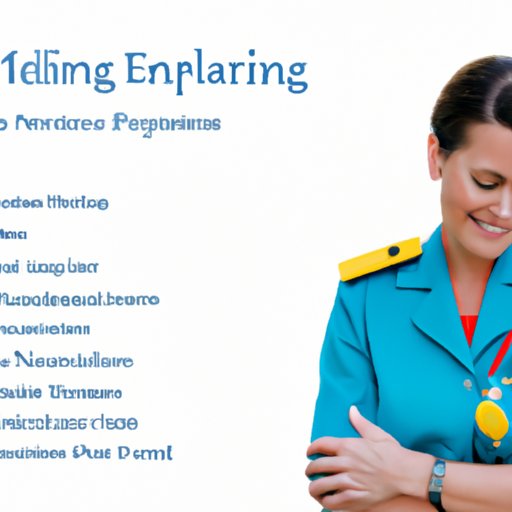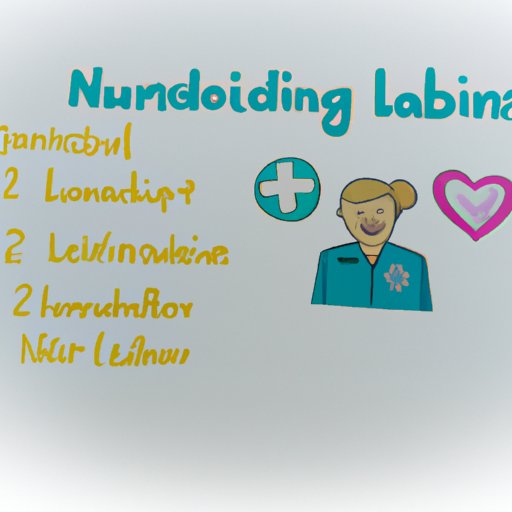Introduction
Leadership is an essential part of any organization, and nursing is no exception. Effective nursing leaders have the ability to inspire their teams and create a positive work environment that promotes collaboration, communication, and respect. But what exactly makes a good leader in nursing? This article will explore the qualities, leadership styles, and strategies for developing leadership skills in nurses, as well as the impact of good leadership on patient care.
Analyzing the Qualities of Effective Nursing Leaders
Nurses are expected to not only provide excellent patient care but also demonstrate strong leadership skills. In order to be an effective leader in nursing, there are certain qualities that must be present. Here are some of the most important qualities of a successful nursing leader:
Communication Skills
Good communication skills are essential for any leader, and this is especially true in nursing. A nurse leader must be able to communicate effectively with their staff, patients, and other healthcare professionals. They should be able to clearly articulate their goals and expectations, as well as listen to and understand the needs of those they are leading.
Decision-Making Ability
Leaders in nursing must be able to make quick and informed decisions in challenging situations. They should be able to assess the situation and weigh the potential risks and benefits of each decision before making a final call. This requires critical thinking skills and the ability to stay calm under pressure.
Commitment to Patient Care
Above all else, a nurse leader should be passionate about providing the best possible care for their patients. They should be committed to upholding high standards of care, as well as staying up to date on new developments in the field of nursing.

Examining Leadership Styles of Successful Nursing Managers
Different types of leadership styles can be employed by nurse managers depending on the situation. Here are three of the most common leadership styles used by nurse managers:
Autocratic
An autocratic leadership style involves the leader making decisions without input from the team. This type of leadership can be beneficial in times of crisis, when quick decisions need to be made, but it can also lead to feelings of resentment and low morale among staff members.
Democratic
A democratic leadership style allows the leader to involve the team in the decision-making process. This encourages collaboration and open communication, which can lead to higher levels of job satisfaction and increased productivity. However, this type of leadership can also lead to lengthy decision-making processes.
Transformational
A transformational leadership style focuses on inspiring and motivating the team to reach their full potential. This type of leadership encourages innovation and creativity, and can lead to higher levels of job satisfaction and better patient outcomes. However, it can be difficult to maintain a transformational leadership style over a long period of time.
Exploring the Impact of Good Leadership on Patient Care
Good leadership in nursing has a direct impact on patient care. Here are some of the ways that good leadership can improve patient outcomes:
Improved Quality of Care
Good leaders in nursing are able to create an environment where their staff feels supported and motivated. This leads to higher levels of job satisfaction, which in turn leads to improved quality of care for patients. Good leaders are also able to foster a culture of safety, which reduces the risk of errors and improves patient outcomes.
Increased Patient Satisfaction
Good leaders in nursing are able to create an environment where patients feel respected and valued. This leads to increased levels of patient satisfaction, which in turn can lead to improved health outcomes. Good leaders are also able to ensure that their staff is adequately trained and knowledgeable, which can lead to faster diagnosis and treatment.
Enhanced Staff Morale
Good leaders in nursing are able to create an environment where their staff feels valued and appreciated. This leads to higher levels of job satisfaction and morale, which in turn can lead to increased productivity and better patient outcomes.

Investigating the Role of Emotional Intelligence in Nursing Leadership
Emotional intelligence is an important component of successful nursing leadership. Emotional intelligence refers to the ability to recognize, understand, and manage one’s own emotions and those of others. Here are some of the components of emotional intelligence:
Self-Awareness
Self-awareness is the ability to recognize and understand one’s own emotions and how they affect others. Good leaders in nursing are able to recognize their own strengths and weaknesses, as well as their impact on those around them.
Social Awareness
Social awareness is the ability to recognize and understand the emotions of others. Good leaders in nursing are able to empathize with their team members and understand how their actions and decisions will affect them.
Self-Management
Self-management is the ability to manage one’s own emotions and behavior. Good leaders in nursing are able to remain calm and composed in challenging situations, as well as take responsibility for their actions.
Relationship Management
Relationship management is the ability to build and maintain strong relationships. Good leaders in nursing are able to foster trust and respect among their team members, as well as create an environment of collaboration and open communication.

Assessing the Benefits of Team Building for Nurse Leaders
Team building exercises can be an effective way for nurse leaders to foster collaboration and communication among their staff. Here are some of the benefits of team building for nurse leaders:
Improved Collaboration
Team building activities can help foster collaboration among staff members. This can lead to increased efficiency and productivity, as well as improved patient outcomes.
Enhanced Problem Solving
Team building activities can help foster problem solving skills among staff members. This can lead to more creative solutions to challenges, as well as increased job satisfaction.
Increased Productivity
Team building activities can help increase morale and motivation among staff members. This can lead to higher levels of productivity and better patient outcomes.
Identifying Strategies for Developing Leadership Skills in Nurses
In order to be an effective leader in nursing, it is important to develop the necessary skills and knowledge. Here are some strategies for developing leadership skills in nurses:
Mentorship Programs
Mentorship programs can be an effective way for nurses to develop their leadership skills. Through mentorship, nurses can learn from experienced leaders and gain insight into their own leadership abilities.
Professional Development Opportunities
Nurses should take advantage of professional development opportunities such as conferences and seminars. These can provide nurses with valuable knowledge and insights into the latest developments in the field of nursing.
Shadowing Experiences
Shadowing experienced nurses can be a great way for nurses to learn about leadership. By observing how experienced nurses handle different situations, nurses can gain valuable insights into effective leadership.
Conclusion
In conclusion, effective leadership is essential in nursing. Good leaders in nursing possess certain qualities, such as strong communication skills and decision-making ability, as well as a commitment to patient care. They can employ different leadership styles depending on the situation, such as autocratic, democratic, or transformational. Good leadership in nursing has a direct impact on patient care, as it can lead to improved quality of care, increased patient satisfaction, and enhanced staff morale. Emotional intelligence is also an important component of successful nursing leadership, as it involves the ability to recognize, understand, and manage one’s own emotions and those of others. Finally, team building activities and mentorship programs can be effective strategies for developing leadership skills in nurses.
(Note: Is this article not meeting your expectations? Do you have knowledge or insights to share? Unlock new opportunities and expand your reach by joining our authors team. Click Registration to join us and share your expertise with our readers.)
